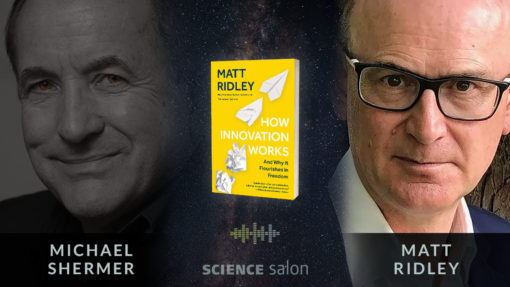innovation

Steven Pinker, Matt Ridley, and Michael Shermer discuss global challenges and progress at FreedomFest 2024. They analyze impacts of COVID-19, DEI initiatives, and AI, while examining democracy, autocracy, and historical crises. They offer perspectives on leveraging innovation, rationality, and education to navigate complex times, challenging conventional narratives and proposing ways to move society forward.

Shermer and Shtulman discuss: • imagination: the capacity to generate alternatives to reality • imagination’s purpose and structure • anomalies and counterfactuals • principles: scientific, mathematical, ethical • models: pretense, fiction, religion • development of imagination • how children understand causality • purpose of pretend play • theory of mind • religious practices • AI and creativity • The Beatles • Montessori education.
In Science Salon # 125 Michael Shermer speaks Bjorn Lomborg about his new book False Alarm: How Climate Change Panic Costs Us Trillions, Hurts the Poor, and Fails to Fix the Planet.

Bjorn Lomborg argues that climate change is real, but it’s not the apocalyptic threat that we’ve been told it is. Projections of Earth’s imminent demise are based on bad science and even worse economics, he claims. Lomborg attempts to convince us that everything we think about climate change is wrong — and points the way toward making the world a vastly better, if slightly warmer, place for us all.

Innovation is the main event of the modern age, the reason we experience both dramatic improvements in our living standards and unsettling changes in our society. Matt Ridley argues that we need to think about innovation as an incremental, bottom-up, fortuitous process that happens to society as a direct result of the human habit of exchange, rather than an orderly, top-down process developing according to a plan.
In Science Salon # 117, Michael Shermer speaks with Matt Ridley about his book How Innovation Works: and Why It Flourishes in Freedom.












